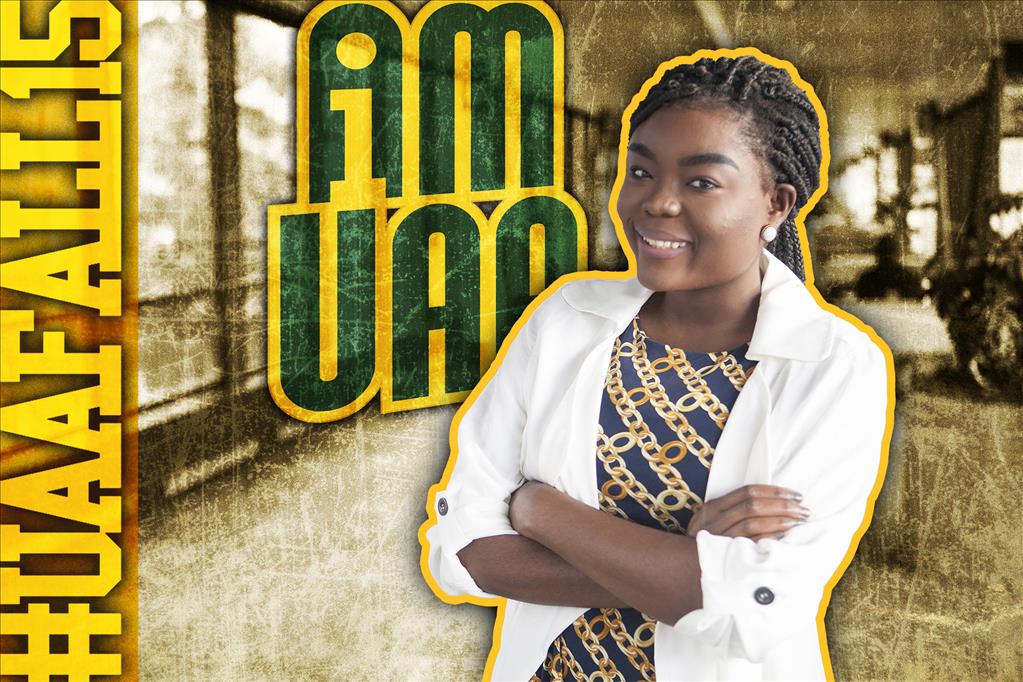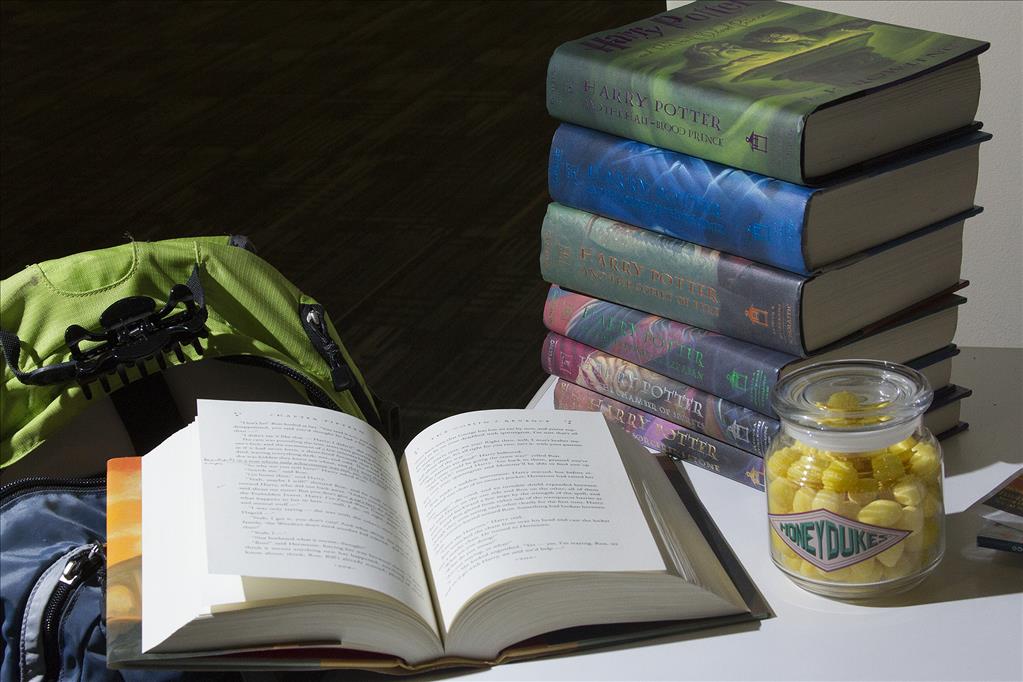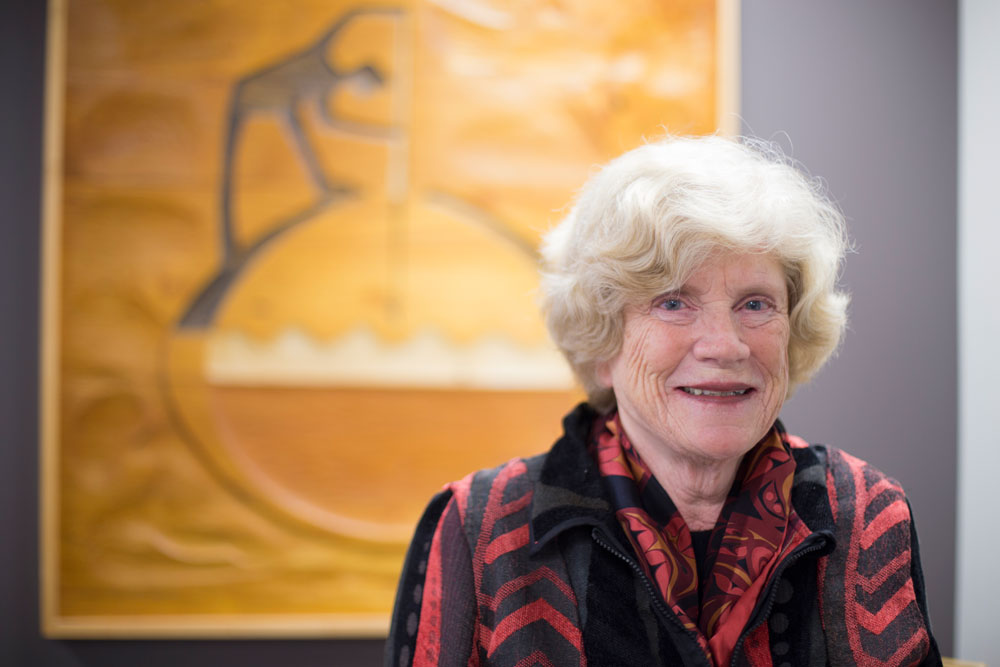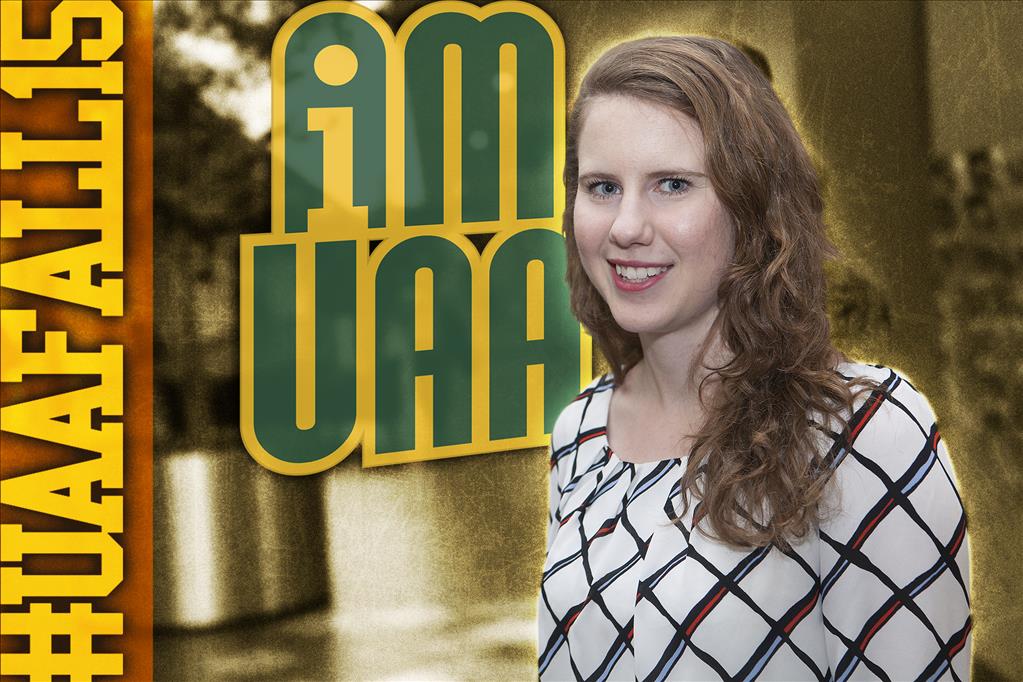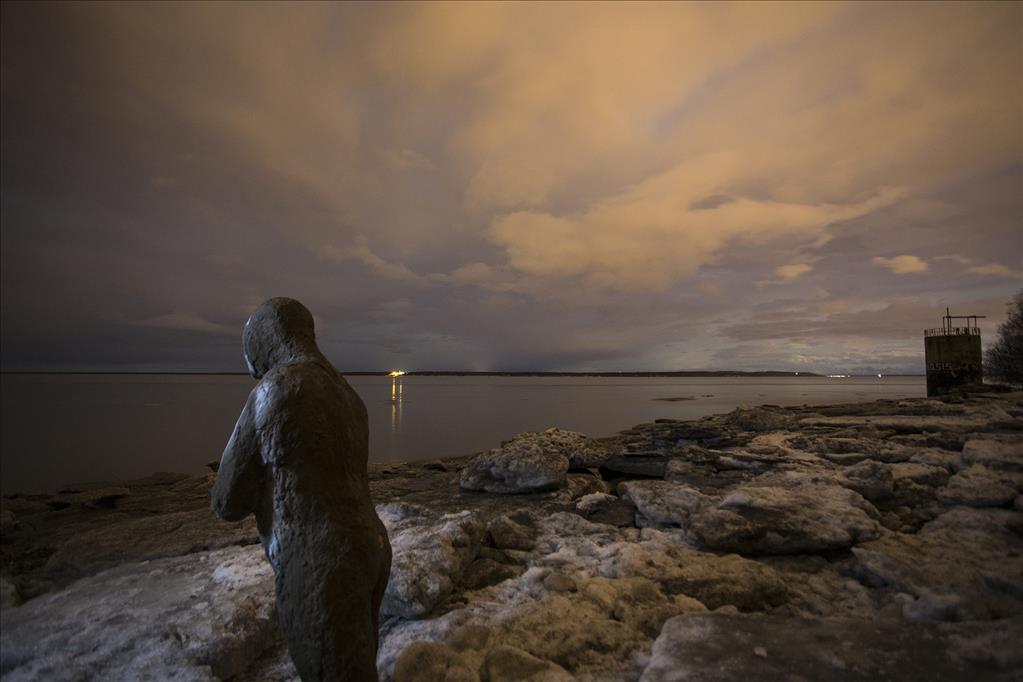National debate tournament brings alumni back
by Joey Besl |
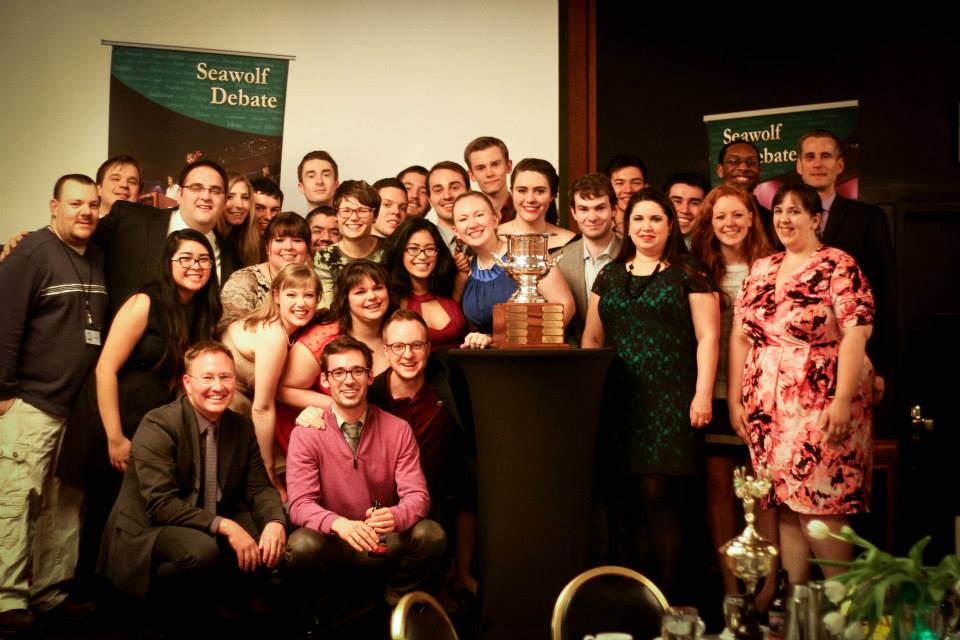
Dozens of alumni and students from Seawolf Debate gathered for a reunion on Friday, April 10, the night before the U.S. Universities Debating Championships. Last month, UAA hosted 170 teams from nearly 60 universities for the country's top debate tournament. (Photo courtesy of Steve Johnson/University of Alaska Anchorage)
Alumni came from down the street and around the world to help out at the 2015 U.S. Universities Debating Championships (USUDC)-the nation's top debate tourney-hosted by UAA April 11-13.
USUDC provided UAA's world-ranked Seawolf Debate another chance to shine on the national stage. Just as important, though, it gave dozens of debate alumni a chance to come home. Former Seawolf debaters came from Anchorage, Juneau, D.C. and Texas to assist with the tournament-one even flew back from South Korea.
The overwhelming response was fitting for a massive event like USUDC. Over a span of three days, 170 teams from nearly 60 universities went head-to-head in 360 live debates held all across campus, culminating in a championship round before an audience of over 700.
For a program that has earned a global reputation-even ranking in the top 10 in the world in 2012-hosting was a significant honor. For the returning alumni, it was a chance to reconvene and celebrate the program they helped build.
Highlights and history of Seawolf Debate
Seawolf Debate has existed in some form since the Anchorage Community College days. Back in 1972, the team traveled as far as Bozeman and Tempe to compete. More recently, though, members have stamped their passports in India, Greece and even Botswana to take on the world's oratory all-stars. Currently, Seawolf Debate is ranked #17 on the planet.
The reputation of Seawolf Debate is largely owed to the legacy of its alumni and its coach of 19 years, Steve Johnson. Under Steve's watch, UAA took home national titles in 2002 and 2005-one team even advanced to the final eight at Worlds in 2007.
While organizing USUDC, Steve invited former students to help judge the immense tournament. The alumni response was incredibly enthusiastic.
"That's a pretty strong comment on what this event meant to them that years after the fact they're willing to come back and give a whole weekend to a project like this," Steve said.
The weekend kicked off on Friday, when nearly 30 alumni and current students gathered at the Captain Cook to reminisce over the glory days, the rounds they remembered, the tournaments they attended and the skills they gained from debate.
"That was really the high point of the weekend," Steve said of the kickoff reunion. "It's a very humbling experience to be part of something like that, to see parallels in their development ... It's just a wonderful thing."
Three-dimensional chess
In the current format-known as British Parliamentary-four teams of two face off in a debate. Participants learn their topic and positions-two teams argue for an issue, two argue against-only 15 minutes before the debate starts. It's a pressure cooker environment, as all eight participants get seven minutes to state their case while deflecting constant attacks from the other side.
"It's like taking a chess board and making it three-dimensional," said Michael Rose, B.A. '09, who won a national championship for UAA at the first USUDC tournament in 2005.
"It forces you to think quickly and think on your feet and be able to speak immediately," noted Brett Frazer, B.S. '12.
That pressure was largely off the alumni volunteers this time around. As judges, they could sit back and determine who made the best arguments on topics that ranged from immigration to teacher's union to police interrogations.
A toolkit for the future
Since leaving UAA, debate alumni have taken on careers across the board. Some went into non-profits, some work for Native corporations. There are analysts and lobbyists, PR execs and political consultants, and of course a few lawyers. Despite their diverse careers, debate alumni all owe a piece of their path to their years on Seawolf Debate.
"To a pretty large degree, it's hard to separate my personal identity and who I'd be without debate. It's been tremendously influential," explained Drew Cason B.A. '13, who currently works as a policy analyst in Washington, D.C. "You can have an extremely simple argument dressed in extremely technical language. Debate is helpful in identifying structures of debate and that's something I deal with constantly."
Drew's former teammate Brett works with the same skills. He even spent the past two years living and breathing debate in Asia.
"Debate gave me the confidence to defend my convictions, to speak up more often in class, to get involved in my community," he said. For the past two years, he passed those lessons on to his students in Malaysia and South Korea.
Debate is big business in Asia-it's a tool to teach English, as well as confidence and conviction in a foreign language. Brett worked as a debate teacher and private coach and even represented the Americas (yes, both continents) on the adjudication panel for the World Championships in Malaysia in 2013. USUDC made a great intermission between leaving Asia and starting law school at University of Michigan this summer.
For Michael, now a lawyer in Anchorage, debate provided him a toolkit for his career. "That kind of sophisticated logical analysis and reasoning is critical in law. It's one of the hardest skills first-year law students have to develop," he said. "I definitely feel I had a step up."
In debate, competitors try to knock each other off their guard with pointed accusations and one-line zingers. That improvisational style has paid off immensely. "There are countless examples of times I've had to think on my feet in trial settings," he added. Proof? Recently, Michael stepped in last-minute on a high-stakes case. He studied up, formed his arguments and earned a $51 million award for his client.
"Debate is the most important academic decision I made in my life," Michael noted. "I could talk about this stuff for hours. It's such an important part of my life."
The most valuable thing he gained from Seawolf Debate, though, was his wife, Nikki Rose, B.A. '10. The couple met on the debate team at UAA and both judged at USUDC, balancing the busy weekend with caring for their 2-year-old son.
"I think the greatest benefit on a personal level was just the camaraderie of the team," Nikki said of her years with Seawolf Debate. "It allowed me to really get involved with the university ... it was an opportunity to be surrounded by people that succeed and pursue their dreams."
"One of the things Steve taught us is perfection isn't the goal, but you can always make things better. I see that in my adult life as an alum-there's always room for improvement."
Michael and Nikki received a special shout-out at the USUDC banquet on Sunday night. In front of over 200 guests, right after Mayor Sullivan addressed the crowd, Steve Johnson took the mic and acknowledged Michael's national championship at the inaugural USUDC in 2005.
"We were very touched," Nikki said of the recognition. "Ten years ago we got married. And 10 years ago he won the national championship. So it was quite a year," she laughed.
Home field advantage
UAA's home field advantage worked in their favor. Two Seawolf teams advanced to Monday's knockout rounds, one pair even made the round of 16. Stacked against Ivy League mainstays, UAA made it further than any other public university in the nation.
For most of the alumni, seeing a tournament of this size hosted on campus was beyond belief.
"I never thought it would happen ... Without the judges and the donations and the university support, we wouldn't have been able to do this," Nikki said. "I think that [support] shows how Alaska outshines these other universities."
Seawolf Debate has always taken a unique community approach, staging annual Anchorage showdowns with big-ticket debate squads (like Stanford and Harvard) and sending students to coach in the school district. That outreach has worked in their favor as well.
"I ran into my neighbors at the final round and I just thought that was amazing, these people I grew up next to who have nothing to do with debate, aside from living in Anchorage, showed up to watch the final round," added Brett.
"I would have loved to be debating competitively in Anchorage with people coming to watch it," Drew admitted. "I forgot how fun it was and how much I enjoyed spending time with those people."
"One of the consistent points of feedback I got from alumni was just how proud they were to be associated with the program that's now getting front page coverage," Steve said.
"One of the things I kept reflecting on over the weekend is this is one of the hallmarks of UAA becoming a mature university," he continued, citing the intense connection his former students feel to UAA and their Seawolf Debate tradition. "That's ultimately what the collegiate experience needs to be about."
"We now have all these people that recognize that connection, and its meaningful and influential and informative ... I think it's a testament to what UAA is becoming."
View a slideshow and recap of USUDC 2015.
 "National debate tournament brings alumni back" is licensed under a Creative Commons Attribution-NonCommercial 4.0 International License.
"National debate tournament brings alumni back" is licensed under a Creative Commons Attribution-NonCommercial 4.0 International License.










